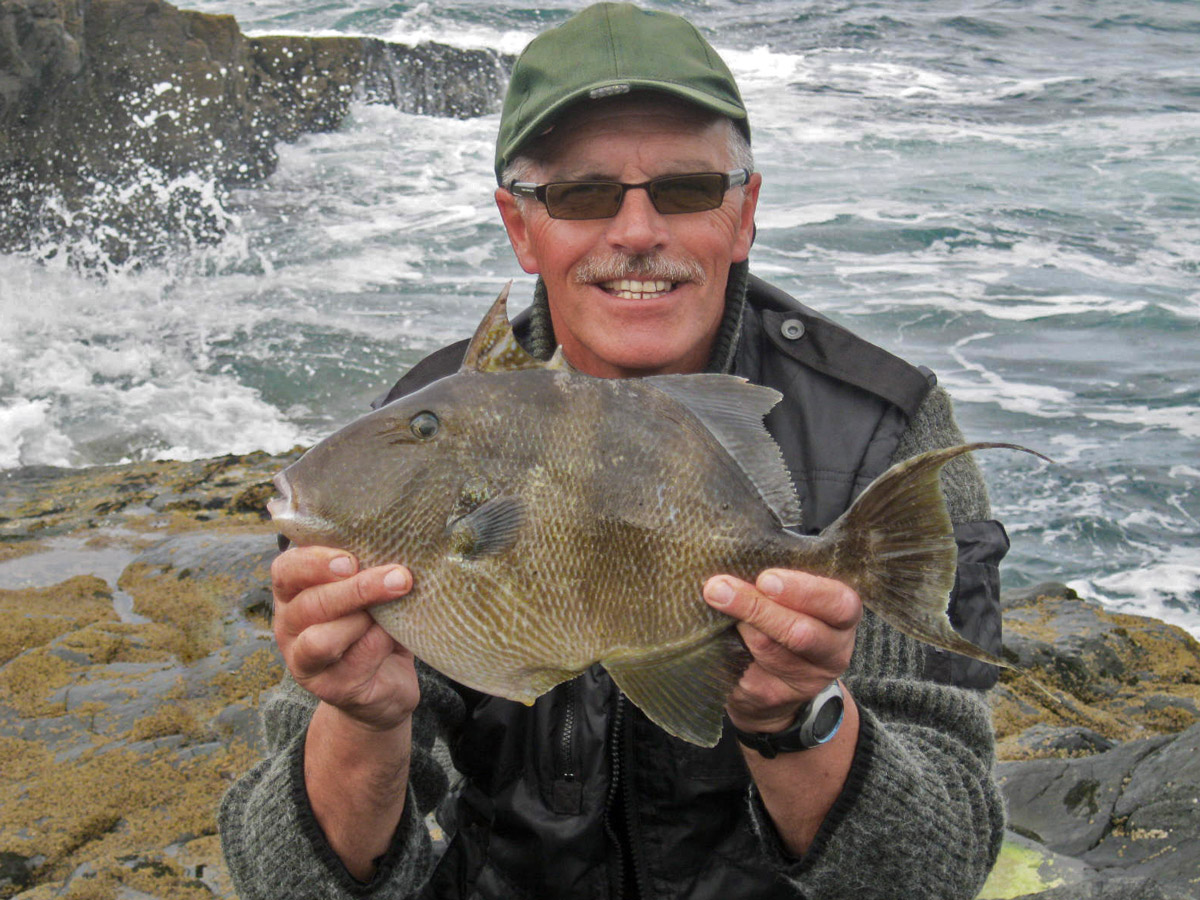Stranger on the shore
Bill Ryan ponders on one of our most exotic and unusual marine fish species, the triggerfish
Issue 3 (May-Jun 2015) Bill Ryan
What I love about fishing is that anything can turn up. You target a particular species and something else grabs on. Not what you were looking for but a bonus. Sometimes it is unusual, sometimes rare, something to add to your species list and sometimes, as my Polish friend Pawel says, you have “empty hooks“!
My favourite fishing is from the craggy Atlantic-battered rocks of West Clare down into the rock-strewn gullies among beds of heavy kelp in search of rod bending ballan wrasse. Fishing with artificial baits like soft plastics or natural baits such as crab and limpet can temp the savage bite. Once while fishing ragworm for wrasse I decided to move without reeling in and started to move to another gully when a 10lb pollock took the moving ragworm. I have also had conger on crab intended for wrasse. Another time, a lobster on lugworm.


In the summer of 1995, while fishing for wrasse at the Bridges of Ross, Co. Clare , I had been missing several bites and after another miss I was retrieving my line to check the bait when, in the clear water, I noticed a peculiar tropical looking fish following my lead weight up through the water and nipping at it! I recognised the fish as a triggerfish (Balistes capriscus) and although I had never caught one I had seen photographs. This happened several more times so I put on a smaller piece of crab on a smaller hook and lowered it slowly into the water. The triggerfish followed the lead weight up from the bottom but this time it had a shoal of its mates with it! One saw the baited hook and grabbed it. It went off sideways, scuttling through the water putting a nice bend in the rod. I succeeded in landing it, my first ever trigger. I mashed up some crab and threw it in the gully only to see a shoal of triggerfish surface and scoff the lot! Luckily I had a good supply of crab with me so I brought the shoal to the surface with more mashed crustaceans and proceeded to fish amongst them. I caught and released over 20 triggerfish this way, the best weighing 4.23lbs.
Many bites were missed that day as they have tough mouths and it is difficult to set the hook. I also had many bite-offs as their teeth are razor sharp. They chew on the hook as you try to unhook and release them and the rasping sound certainly makes you very careful where you put your finger! This was an unexpected catch but very welcome; a tropical-looking fish from Irish waters. It had been a very warm summer (’95) and being near the end of August the sea temperature was at it maximum. I caught more triggerfish that August and September from the same area but as they disappeared I wondered would I ever see one again? Was it a ‘once off’?

Since that glorious summer the triggerfish did appear some summers on the West Clare coast but there were also summers when I did not catch or see a single one. Favourite places are The Bridges of Ross, and Baltard near Doonbeg. They seem to favour gullies which face the sun for most of the day and have submerged ledges. Once they get under the ledge and lock themselves in with their strong sharp dorsal spines the battle between angler and fish is over! I have been hooked up to a fish for nearly an hour and it never came out. They are not an easy target, that’s for sure.

The best time to triggerfish is in warm settled weather around the end of August, through September and sometimes into early October. They will take a variety of typical wrasse baits including crab, limpet, shrimp, rag, lug and fish strips. To contend with both the fish’s harsh teeth and snaggy home I recommend tackling up with a size 4 carp hook with a short 50lbs. B.S. snood. Sometimes the bite is savage and other times you just feel a trembling on the line as the triggerfish happily munches away! Be prepared, though, for that mad dash under a ledge. Use a landing net as sometimes they will not be hooked but will be holding the hook in their teeth and will let go at the last minute!
I cannot wait for summer…
Bill Ryan
